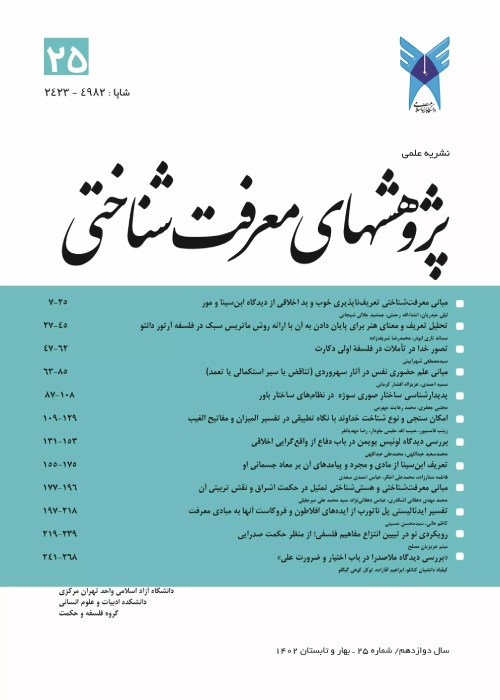Analysis of “the Paradox of Sensory Knowledge” in Aristotle’s Philosophy
Author(s):
Article Type:
Research/Original Article (دارای رتبه معتبر)
Abstract:
In Aristotle's philosophy, knowledge begins with the senses, and sensory perceptions bring knowledge to man through the activity of the "nous" faculty. Unlike Plato, Aristotle denies any innate knowledge; but on the other hand, he clearly states that sensory perceptions do not belong to knowledge and one cannot acquire knowledge to the senses. This creates a paradox in Aristotle's philosophy. If sensory perceptions do not belong to knowledge, how does knowledge arise from "what does not belong to knowledge" and because of the lack of which component of "knowledge", these perceptions do not belong to "knowledge"? According to the authors, the solution to this paradox goes back to the definition of "knowledge" and the possible role of sensory perceptions in the emergence of knowledge in Aristotle. Aristotle does not consider knowledge to be merely "justified true belief" but narrows the scope of "knowledge" to other conditions such as necessity and causality. Therefore, although belief in sensations is a true belief, but these perceptions do not belong to "knowledge" due to the lack of the condition of generality and causality.
Keywords:
Language:
Persian
Published:
Journal of Epistemological Research, Volume:10 Issue: 1, 2021
Pages:
7 to 28
magiran.com/p2318511
دانلود و مطالعه متن این مقاله با یکی از روشهای زیر امکان پذیر است:
اشتراک شخصی
با عضویت و پرداخت آنلاین حق اشتراک یکساله به مبلغ 1,390,000ريال میتوانید 70 عنوان مطلب دانلود کنید!
اشتراک سازمانی
به کتابخانه دانشگاه یا محل کار خود پیشنهاد کنید تا اشتراک سازمانی این پایگاه را برای دسترسی نامحدود همه کاربران به متن مطالب تهیه نمایند!
توجه!
- حق عضویت دریافتی صرف حمایت از نشریات عضو و نگهداری، تکمیل و توسعه مگیران میشود.
- پرداخت حق اشتراک و دانلود مقالات اجازه بازنشر آن در سایر رسانههای چاپی و دیجیتال را به کاربر نمیدهد.
In order to view content subscription is required
Personal subscription
Subscribe magiran.com for 70 € euros via PayPal and download 70 articles during a year.
Organization subscription
Please contact us to subscribe your university or library for unlimited access!



